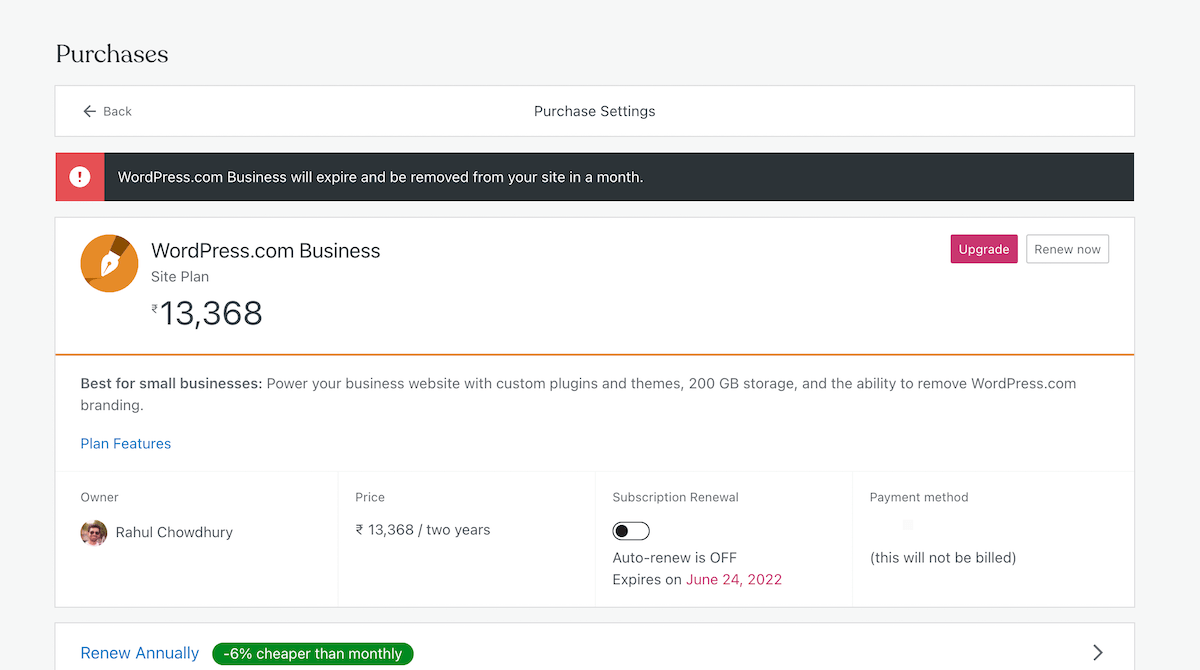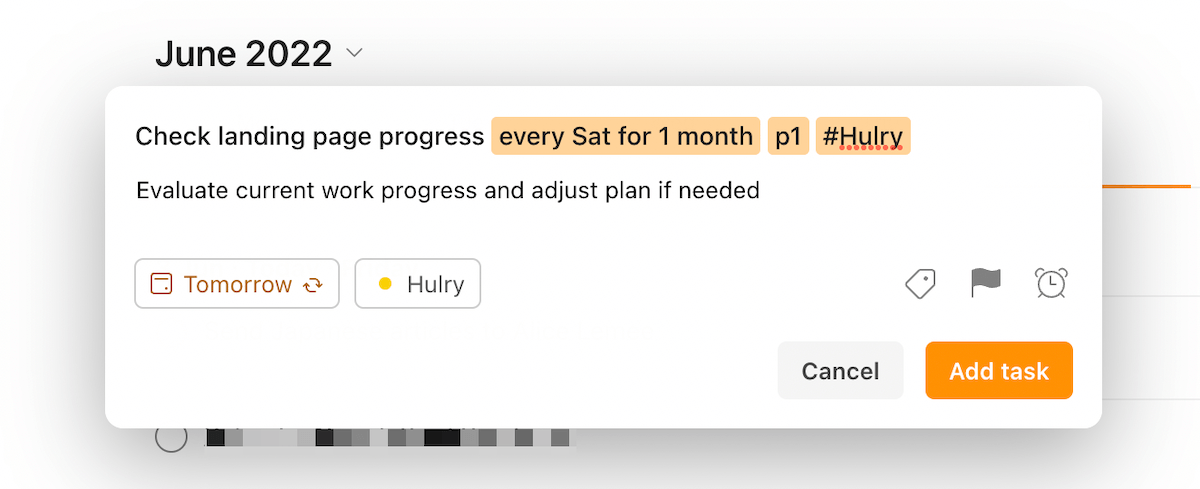Finishing projects on time can be challenging.
Before you know it, you only have 10 days left on your deadline and still have over 80% of the work left to do.
Now:
It can be due to procrastination or a thousand other things taking priority over your project.
I've faced this situation both ways.
But, in the last 2–3 months, I was able to complete and deliver two significant Hulry projects on time and in a more streamlined manner.
How?
Using a tactic called:
The "uh oh" moments
Uh oh, what?
Simply put, it's a reality check.
Have you ever had a moment where you look at the state of your work and feel, "uh oh, I'm already halfway through my timeline, and I haven't made as much progress as I should have"?
These are your "uh oh" moments.
When taken the right way, these sudden realisations can help you rebalance your priorities and get work done rather than paralysing you with fear.
How?
When you face an "uh oh" moment in one of your ongoing projects, you have an opportunity to:
- Assess how far you're from your goal
- Cut your scope of work, if required
- Make a gameplan to achieve your goals with whatever time's left
To give you a clear idea of what I'm talking about here's:
How I did it for my book summaries project
Around a month after publicly committing and taking pre-orders for the launch of my actionable book summaries and notes, I had an "uh oh" moment.
I realised that I had only two months left to write over 15 detailed book summaries and design a website to house them.
This seemed an impossible task at the time because even if I wrote two summaries each week, I would still need a week or two to create the summaries website from scratch.
And writing two summaries a week was an impossible task, given I had a newsletter to run and work 8–10 hours a day at a full-time job.
I knew I was in deep trouble.
I had wasted away the first month of my three-month timeline focusing on other areas of the Hulry project rather than working on the upcoming product launch.
But, here's the thing:
Instead of hitting the panic button and calling it quits on the project, I did the following:
- Reduce the scope of the project. I had promised my readers somewhere between 15–20 summaries at launch. And initially, I aimed to add 19–20 summaries to the collection. Although I had already written 2–3 summaries, I was 16 summaries short. Accepting I had less time left, I brought down my target to a total of 15 summaries. This meant I had to write 11–12 more summaries.
- Aim to write at least 1 summary/week. I made this my top priority. With only about 10–11 weeks left, anything less would've been unrealistic to meet my goal of delivering 15 summaries for the collection.
With this midway realisation and a slight tweak in my plan, I was back on track to finish my project on time.
It started looking realistic and feasible again.
But then, this happened:
A few weeks of good progress, and I had another "uh oh" moment during the third last week of my timeline:
I need to work on my summaries website where I'll be publishing these summaries.
Focusing entirely on writing summaries, I had forgotten about building the site where I'll be publishing them.
And that tweaked my priority again. I prioritised working on the website and getting it up and running as soon as possible.
Within a week, my website was up and ready, and I went back to writing summaries.
I had around 10–11 summaries written at the time, and only one and a half weeks left till D-day.
It was time for one last reality check.
I figured if I could take a couple of days off from work, I could work full-time on writing the last 4–5 summaries and add some finishing touches to the site.
And that is precisely what I did.
Those last few days of full-time work helped me drive the project past the finish line before the set launch date.
I had scheduled the summaries project to launch on 30th April, and I wrapped up the project by 28th April.
It was possible because of the timely "uh oh" moments I experienced during the project.
But, here's the thing:
Imagine realising that I have 10 summaries to write and a site to design on April 15th.
It would've been a complete trainwreck, and I would've had to postpone my product launch.
Not a great experience for the group of people who trusted me and collectively put in over $850 to bring this project to life.
Fortunately, it didn't come to that.
So, yeah:
"Uh oh" moments can be good when they come at the right time.
But, wait.
How do you time realisations? Aren't they supposed to come on their own?
True, but you can proactively trigger these realisations using some timely reminders.
We'll talk about setting timely check-ins in a later section.
But before that, here's another time when an "uh oh" moment came in handy:
The time I migrated this blog
In March this year, I decided to move this blog from WordPress to Ghost because it fit my plans with the Hulry project better.
Considering my existing timeline of the summaries project, I estimated that I had around 20 days to complete the migration as my WordPress membership was up for renewal on May 25th.
And that seemed like a comfortable timeline at the time.
But, here's the kicker:
As April rolled in, I had to plan a sudden trip during the first week of May.
My 20-day window shrank to around 13–14 workable days.
Another "uh oh" moment.
And I was under a strict deadline here since failing to move my blog before 25th May would mean I would have to spend extra money buying at least a month's extension of WordPress hosting.

I didn't want to do that.
Knowing that I had less time than I had planned, I started picking up some minor prerequisite tasks as and when I could before going on my holiday.
For example:
- Going through the Ghost documentation to understand how to develop a custom theme
- Making a list of necessary changes that I need to make, leaving out extra enhancements for later
- Visualising what I was going to work on after I returned home from my trip
This process sped up my migration work significantly since I had a concrete plan of the tasks I needed to do during the two weeks of migration with little to no unknowns or blockers left.
And after two weeks of focused work, I migrated this blog from WordPress to Ghost on May 23rd.
Two days before my WordPress hosting subscription renewal.
Once again, an "uh oh" moment saved my plans from getting derailed.
But, here's a problem with relying on these sudden realisations:
They can be erratic.
If you're fortunate, like I was, you might get an "uh oh" moment at the right time to steer your project towards timely completion.
And sometimes, you might have a realisation too late, and you have no option but to drop the project or extend the deadline.
So:
How do we make this process reliable?
By:
Scheduling timely check-ins
Before starting a project, you can set up strategic reminders to understand work progress throughout your timeline.
There are two ways to do this:
- Short projects: Set a single reminder to evaluate your progress during the halfway mark of your projected timeline.
- Long projects: Set up multiple reminders to understand what's going on with your project every month or so.
Regular check-ins like these will help trigger a much-needed "uh oh" moment if things aren't going according to plan and if you need to rethink your approach.
Now:
My previous realisations weren't planned. And fortunately, they came in at the right time.
But, good luck seldom repeats itself.
So, I'm not going to leave these helpful reflections to random chance again.
For my upcoming project, which is designing the landing page for Hulry Summaries, I'll be planning my timely check-ins like this:
I've estimated a generous one-month timeline for this landing page redesign.
And, to make sure that I can deliver on time, I'm setting up a weekly check-in ritual to keep track of my progress throughout the timeline.
Every Saturday, I'll evaluate my current progress on this project and recalibrate my priorities and action plan if I need to.
To make sure I remember to do this, I've set up weekly reminders on the Todoist app like this:

This would be incredibly helpful since I manage multiple Hulry projects like the blog, the newsletter, and the summaries.
And having a weekly check-in ritual will help me rebalance my priorities to focus more on this project if I'm near the deadline and still have too many tasks pending.
For example, I can skip sending the newsletter for one week to dedicate more of my time to the landing page redesign, if need be.
Now:
Timely reminders ensure that we won't be missing out on these helpful check-ins.
But, how do we make these progress checks work to our advantage?
Here's how you can:
Make "uh oh" moments work for you, not against
Sudden realisations like the "uh oh" moments are double-edged swords.
They can either make or break your projects.
Harnessed correctly, they can be a beacon of success for you.
But:
Take it the wrong way, and it becomes a source of stress and mind-numbing anxiety.
So:
Here's a straightforward process that has helped me use these momentary reflections to my advantage so far.
During each scheduled check-in, ask yourself the following questions to help tweak your gameplan:
- How far am I from my target? This helps assess your current work state, the time left till D-day, and how much work you still have left to complete.
- What happens if I don't finish on time? The answer to this question will fuel your intrinsic motivation to finish things on time. For example, you might lose money or the trust of your audience or a good performance evaluation from your manager if you fail to meet the deadline.
- How can I finish on time? Once you understand your work's state, you can trim excess work from your project and realign your schedule to meet your goal within the time you have left.
Now, here's an important thing to remember while you're doing a check-in:
It's natural to feel intimidated by the amount of work still left to be done if you haven't made much progress during the early days of your project.
For example:
I had over 10 summaries to write and a website to design to house the summaries in around 2 months of part-time work.
But, when you split the total work into smaller units, they become realistically achievable.
Retaking my summaries example:
I made a plan to write at least 1 summary per week and dedicate a week to designing and developing the website.
Sometimes, I needed to stretch to make it happen, but it became easier to achieve once I focused on finishing the next summary rather than writing 10 summaries.
Divide and conquer.
So, what are you waiting for?
Try this technique in your next project and witness its power first-hand.



 In-depth articles, series and guides
In-depth articles, series and guides
